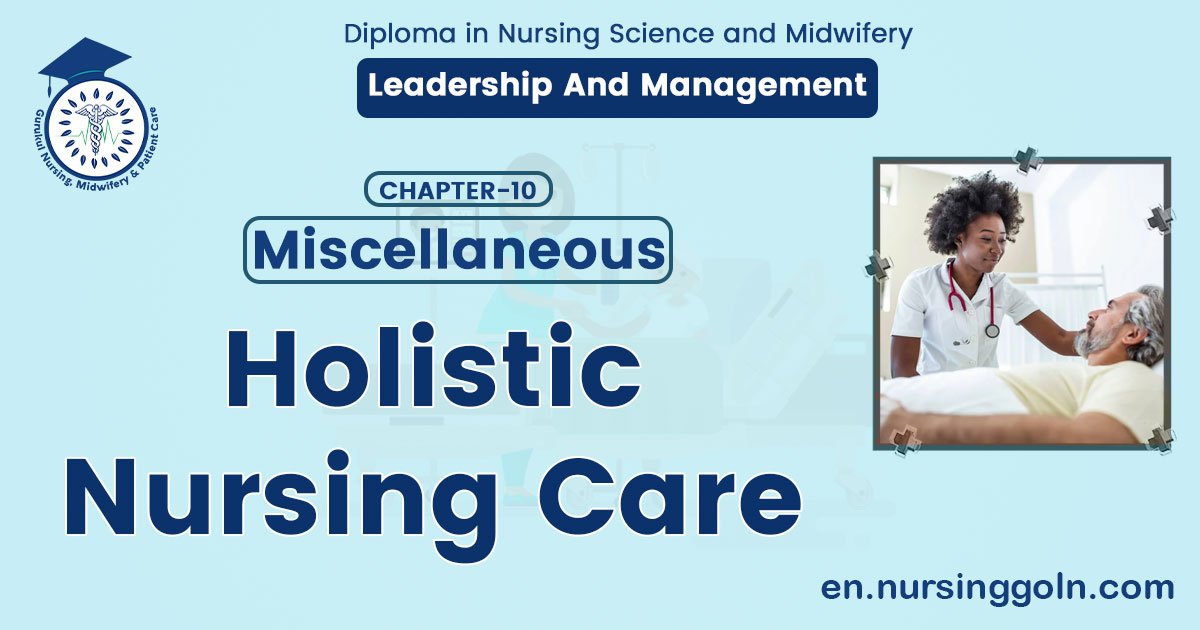Concept of Holistic Nursing Care – This book covers the entire syllabus of “Leadership & Management” prescribed by the BNMC for Diploma in Nursing Science & Midwifery Students.
We tried to accommodate latest information and topics. This book is an examination setup according to the teachers’ lectures and examination questions. At the end of the book previous university questions are given. We hope in touch with the pook students’ knowledge will be upgraded and flourished. The unique way of presentation may make your reading of the book a pleasurable experience.

Concept of Holistic Nursing Care
Definition of Holistic Nursing Care:
According to American Holistic Nurses’ Association, (1998)
Holistic Nursing care is defined as “All nursing practice that has healing the whole person as its goal”
Or,
Holistic nursing care is defined as a practice that focuses on healing the whole person through the unity of body, mind, emotion, spirit and environment. It draws on the specialty of nurses who become therapeutic partners with the people they take care of. More than just a medical assistant, holistic nurses believe in the mental attitudes and spirit to help lift the patient’s wellness through this connection.
Or,
Holistic Nursing care is:
➤ Nursing activities focus the interrelationship between body-mind-spiritual and social components.
➤ Recognize that the whole is more than the sum of each part.
➤ Understanding individual as an integrate whole inter acting with and being acted upon both internal and external environment.
(Ref by-Lecture)
Holistic nursing care is a practice of nursing that focuses on healing the whole person. This practice recognizes that a person is not simply his or her illness. Holistic healing addresses the interconnectedness of the mind, body, spirit, social/cultural, emotions, relationships, context, and environment.
(Ref by-www.nursing-theory.org)

Definition of Holistic Nurse:
The holistic nurse is an instrument of healing and a facilitator in the healing process. Holistic nurses honor each individual’s subjective experience about health, health beliefs, and values.
Holistic nurses may integrate complementary/alternative modalities (CAM) into clinical practice to treat people’s physiological, psychological, and spiritual needs. Doing so does not negate the validity of conventional medical therapies, but serves to complement, broaden, and enrich the scope of nursing practice and to help individuals access their greatest healing potential.
Attributes of Holistic Nursing carea
1) Nurses bring knowledge experience to guide them in becoming therapeutic partners with clients in strengthening the client’s responses to facilitate the healing process and achieve wholeness
2) Use awareness to facilitate healing
3) Provide cultural-congruent care.
(Ref by-Lecture)
Ways to Develop Holistic Nursing Care:
There is no one way to approach a client and no single inter personal strategy that works equally well with every client. Nurses who carry or believe in client centered care bring about their knowledge and skills to each client involuntary.
Novice, nurses or nursing students can develop holistic nursing care through the following guidelines:
1. Study and analyze the concepts,
2. Determine if you use a bio-psycho-social-spiritual model to guide your clinical practice.
3. Determine whether there are areas of fragmentation in your personal life
4. Explore the steps that increase your commitment to your holistic development process.
5. Integrate the standards of holistic into clinical practice. These standards include
a) Client centered care include family and significant others
b) Nurses-focused concepts (committed to personal development)
c) Cultural care.
d) Health education and mutual decision making.
e) Health promotion.
f) Spiritual care
g) Care of the environment.
h) Use of nursing process.
i) Use of research to guide clinical practice
(Ref by-Lecture)

Ways to build Relationship with Patient:
There are many easy ways to improve relationships with patients and promote a healthy psychological, emotional, and spiritual environment.
- . Learn the patients name and use it
- Make good, strong eye contact
- Ask how a patient is feeling and sincerely care
- Smiling and laughing when appropriate
- Use therapeutic touch
- Assist the patient to see themselves as es as someone that deserves dignity
- Preserve their dignity
- Educate your patients on the importance of self-care
- Ask the patient how you can reduce their anxiety or pain
- Use non-pharmacological methods of pain control such as imagery, relaxation techniques, and more
- Encourage patients and assist as needed with alternative treatment modalities; never underestimate the benefit of a massage, aromatherapy, or music
- Ask if patients have certain religious, cultural, or spiritual beliefs; be sensitive and accepting if they do
(Ref by- www.practicalnursing.org)

Significances of Holistic Nursing Care:
1. To enrich and change the direction and content of nursing research
2. To widen the service areas of nursing and to change the traditional image of nurses
3. To contribute to establish a new type relationship between physician and nurse, and relationship between nurse and patient
4. To propose a new type view of nursing administration and leadership
5. To change the curriculum design of nursing education.
Read more:
